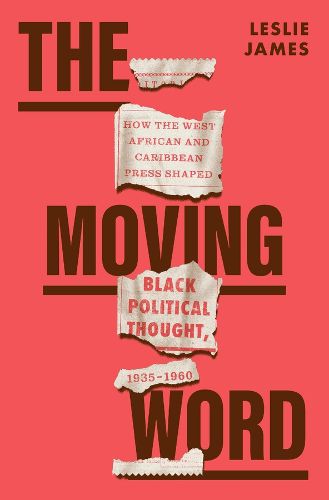Readings Newsletter
Become a Readings Member to make your shopping experience even easier.
Sign in or sign up for free!
You’re not far away from qualifying for FREE standard shipping within Australia
You’ve qualified for FREE standard shipping within Australia
The cart is loading…






A revelatory account of Black Atlantic political thought in the era of decolonization, revealing how West African and Caribbean newspapers invigorated debates about imperialism, capitalism, and Black freedom.
In the 1930s and 1940s, amid intensifying anticolonial activism across the British Empire, dozens of new West African and Caribbean newspapers printed their first issues. With small staffs and shoestring budgets, these newspapers nonetheless became powerful vehicles for the expression of Black political thought. Drawing on papers from Trinidad, Jamaica, Ghana, and Nigeria, Leslie James shows how the press on both sides of the Atlantic nourished anticolonial and antiracist movements. Editors with varying levels of education, men and women journalists, worker and peasant correspondents, and anonymous contributors voiced incisive critiques of empire and experimented with visions of Black freedom. But as independence loomed, the press transformed to better demonstrate the respectability expected of a self-governing people.
Seeing themselves as "the Fourth and Only Estate," the sole democratic institution available to a colonized population, early press contributors experimented with the form and function of the newspaper itself. They advanced anticolonial goals through clipping and reprinting articles from a variety of sources; drawing on local ways of speaking; and manipulating photography, comics, and advertising. Such unruly content, James shows, served as a strategic assertion of autonomy against colonial bureaucracy. Yet in the 1950s, this landscape changed as press professionalism became a proxy for a colony's capacity to govern itself. Influenced by new political paradigms, papers either standardized their formats or stopped publishing altogether. By the 1960s, intellectual debates about racism and colonialism had moved to other kinds of publications.
Illuminating an extraordinary period in the history of Black Atlantic political thought, The Moving Word vividly portrays the power of experimental media.
$9.00 standard shipping within Australia
FREE standard shipping within Australia for orders over $100.00
Express & International shipping calculated at checkout
A revelatory account of Black Atlantic political thought in the era of decolonization, revealing how West African and Caribbean newspapers invigorated debates about imperialism, capitalism, and Black freedom.
In the 1930s and 1940s, amid intensifying anticolonial activism across the British Empire, dozens of new West African and Caribbean newspapers printed their first issues. With small staffs and shoestring budgets, these newspapers nonetheless became powerful vehicles for the expression of Black political thought. Drawing on papers from Trinidad, Jamaica, Ghana, and Nigeria, Leslie James shows how the press on both sides of the Atlantic nourished anticolonial and antiracist movements. Editors with varying levels of education, men and women journalists, worker and peasant correspondents, and anonymous contributors voiced incisive critiques of empire and experimented with visions of Black freedom. But as independence loomed, the press transformed to better demonstrate the respectability expected of a self-governing people.
Seeing themselves as "the Fourth and Only Estate," the sole democratic institution available to a colonized population, early press contributors experimented with the form and function of the newspaper itself. They advanced anticolonial goals through clipping and reprinting articles from a variety of sources; drawing on local ways of speaking; and manipulating photography, comics, and advertising. Such unruly content, James shows, served as a strategic assertion of autonomy against colonial bureaucracy. Yet in the 1950s, this landscape changed as press professionalism became a proxy for a colony's capacity to govern itself. Influenced by new political paradigms, papers either standardized their formats or stopped publishing altogether. By the 1960s, intellectual debates about racism and colonialism had moved to other kinds of publications.
Illuminating an extraordinary period in the history of Black Atlantic political thought, The Moving Word vividly portrays the power of experimental media.